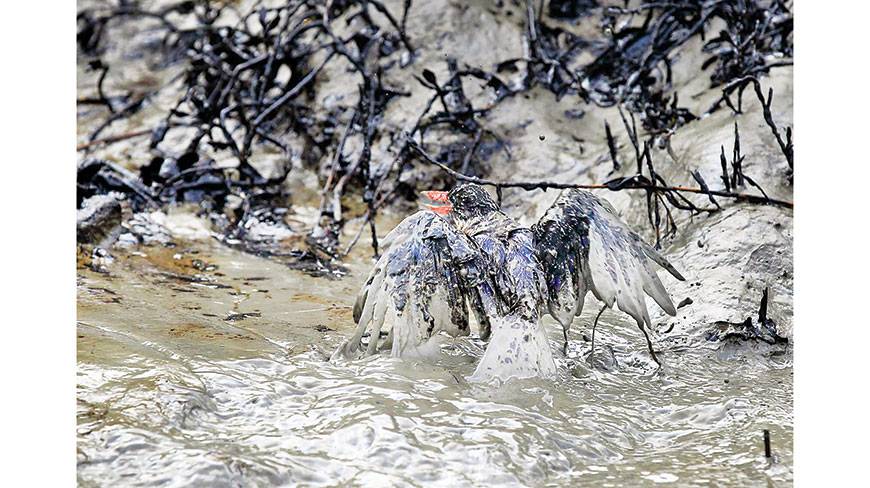Shipping Ministry turns down request to permanently shut down Sela route

The shipping minister must have been in a mood of denial when he said the oil spill would not hurt too much, because it is now becoming clearer with time that what is happening in the Sundarbans is nothing short of a major disaster.
A day after the first sighting of an Irawaddy dolphin corpse, hundreds of marine birds, small fishes and otters could be seen struggling with their lives looking for food in the oil-mixed mud on the banks of Sela River.
The oil has not just polluted the water, it has also crippled the miniature creatures that marine birds like maasranga, small fishes like the mud-keeper and aquatic animals like the otter depend on for food.
“Animals like otter whose body is covered with wool are one of the most affected ones. Because they have to get into water to catch fish forfood, they will never survive in the contaminated water. Moreover, the oily water also damages their furry skin,” said Abu Naser Mohsin Khan, an assistant conservator of the Forest Department.
Fishermen, who depend on the rivers inside the single biggest mangrove forest in the world for a living, have also reported seeing the remains of different types of small fish, shrimps, snakes and crabs.
“I have seen three dead crabs, some shrimp and some other small fish such as the meni while fishing in the Sorki canal in the Chandpai forest range,” said Jamal Hossain Khan, a resident of the Joymonir Gol area.
Some of the field-level officers of the Forest Department have also had the same sightings, Divisional Forest Officer Zahidul Kabir told the Dhaka Tribune.
“The actual extent of the damaged caused to the wildlife cannot detailed right now. It will take time,” he said.
The Forest Department yesterday formed a monitoring team tasked with patrolling the Sundarbans to measure the damage caused by the oil.
Officials fear that the oil, which has already reached the Boleshwar River through canals of the Sela River, will also cause health hazards to humans.
“Local shrimp yards take saline water from these rivers. If humans consume the shrimp cultivated in these oil-contaminated water, there may be consequences,” said forest officer Abu Naser.
The body of Mokhelsur Rahman, shipmaster of the distressed ship, was recovered yesterday. He went missing after jumping into the water along with his crew members when the vessel was hit.
Oil collection
Local people were never going to get too far with manually collecting the oil from the water. Yesterday, several oil collectors said they had lost interest because the owner company was not paying them the promised Tk30 per litre.
As of yesterday, Padma Oil Company, owner of the oil, has only collected around 20,000 litres of the spilled oil from the locals which is merely one-tenth of the 200,000 litres feared to have spilled and spread over an 80km area in the forest.
Around 6am on Tuesday, oil tanker Southern Star 7, carrying 357,664 litres of furnace oil for a power plant in Gopalganj, sank in the Sela River, a sanctuary of dolphins, after being hit by another cargo vessel.
When the vessel was salvaged more than two days later, around two-thirds of the oil spilled into the river. Furnace oil, which comes in thick black chunks, have already covered the vegetation on the banks of the Sela River in a thick black sheet of oil.
Amir Hossain Chowdhury, another divisional forest officer, said the local people can collect 50,000 litres at best. “As more time elapses, the oil will get more difficult to collect because it will settle everywhere,” he said.
Shipping Ministry adamant
In an inter-ministerial meeting at the secretariat yesterday, the Shipping Ministry yet again turned down a Forest Ministry recommendation to permanently make the Sela River off limits for large commercial vessels.
Emerging from the meeting, Shipping Minister Shajahan Khan, who said on Saturday that the oil spill was not a matter of big concern, told journalists yesterday: “Because the Sela channel is temporarily shut down, vessels [to and from the Mongla port] are having to travel 100 additional kilometres.”
He has been saying from the beginning that the Sela route could not be permanently shut down because it would “virtually cripple the Mongla port.”
The meeting yesterday made another decision to raise the price of crowd-collected oil to Tk40 per litre from the existing Tk30.
Shajahan also said the vegetation along the riverbanks will be cleared by trimming and using sprays.
Yesterday’s meeting also decided to arrange emergency relief for the local people who depend on catching crab, oyster and small fish.
Human chain
A number of pro-environment groups yesterday formed a human chain at the Mongla port town demanding a ban on commercial vessels plying the Sela River.
They also demanded neutral investigation into the accident and adequate safety measures for the mangrove forest which plays the role of a natural shield for the country.
Poribesh Bachao Andolon (Poba), Mongla Nagorik Samaj, Save the Sundarbans Foundation, Bangladesh Resource Centre for Indigenous Knowledge (Barcik) and Service Bangladesh jointly organised the human chain.
Source: Dhaka Tribune









